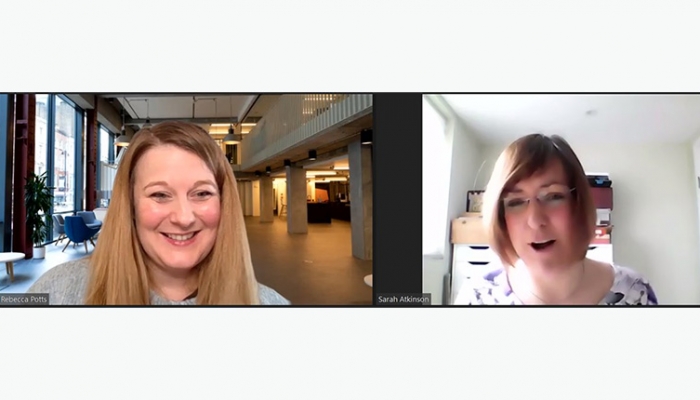accessmatters with The Social Mobility Foundation’s Sarah Atkinson
‘Something isn’t working when talent still isn’t making as much of a difference as background. Whole communities can be left behind from success, from aspiration. PR is no exception.’
Sarah Atkinson from The Social Mobility Foundation joined us for our latest accessmatters session, which focused on social mobility – or the lack of it – in the UK, including the PR industry. Problems with diversity and social mobility in our sector are well-known by now, with CIPR’s State of the Profession highlighting issues with class and background, race and gender, year after year.
PRs are more likely to have completed a degree in comparison to the general public. They’re more likely to come from a background where their parents also undertook higher education. According to the numbers, there are twice as many PRs whose parents or guardians completed a university degree (or an equivalent) than those who received income support or free school meals during childhood.
For Sarah and The Social Mobility Foundation, change is long overdue: ‘We know there’s a race problem in PR, we know that there’s not enough people with disabilities working in the industry. Racial disadvantage is completely entwined with economic disadvantage.
‘Even if you went to a good university, you’re likely to earn less money if you come from a working-class background. And if everyone comes from the same background in PR, you’re going to have something missing when trying to engage the public.’
The Social Mobility Foundation works with young people from disadvantaged backgrounds to improve their confidence, give them the skills to ‘schmooze’ (of course those from working class backgrounds can schmooze just as well as those from middle class families when given the opportunity and experience, said Sarah during the session) and links with potential mentors and future employers give them the head-start they won’t have in comparison to many others at the beginning of their career journey.
What can those making the big decisions in PR do to help with welcoming (and keeping) those from disadvantaged, low-income or working-class backgrounds into the workforce? To start, recognise the problem.
‘It’s generally assumed that once you’re at work, your background doesn’t matter anymore, that it goes under the radar. If you actually come from a disadvantaged background, you damn well know it does matter,’ said Sarah.
‘There are two practical steps to start with – data and leadership. These things go together. We need to measure a baseline for the workforce with three key questions: did your parents go to uni? What school were you at at 14-years-old? And were you on free school meals? It’s not perfect, but it’s the best analysis we’ve got. You can start to measure whether we’re making change.
‘Leaders from privileged backgrounds may feel uncomfortable, might feel that they’re being patronising when talking about this. Make a clear personal commitment, and don’t say too much in the beginning.
‘People have to trust others to have the right intentions. If you come from a working-class background, you need to know it’s not going to matter in a negative way, to trust that positive things can happen.’
And when it comes to recruitment, Sarah urged that organisations start the right way: ‘Analyse the process – that’s critical in every company. If you’re automatically asking for degrees for jobs where they’re not needed, or if your process filters out those from low social economic backgrounds, that’s undermining any other efforts you make to be inclusive.
‘Very few employers are good at this when it comes to progression at the senior level,’ said Sarah. ‘It’s really hard to get there if you come from a low socio-economic background. If you’re there already, work with your employees and start focus groups – ask, have we got some unintended bias going on?
‘Because there’s getting in, and there’s getting on and you need to have something that addresses both.
‘The assumption can be that if you work on the ‘getting in’ part, your pipeline, it’ll all work out. But we know that’s not true from all the work we’ve done on gender – we’re still waiting for more women to reach the top spots.’
‘As a minority in the PR industry, you either have to hide it, if you can, or take it on as a ‘fun personality’. We’ve heard this from ethnic minorities and those from working class backgrounds – ‘It’s a burden of the work I have to do, I have to be this perfect person, or a comedy stereotype’.
‘It’s tough on people who have to do the work. If you aren’t one of them, be an ally.
‘The best thing we can do for social mobility is to talk about it more,’ believes Sarah.
For more from accessmatters, catch up with our previous sessions with KDP Coaching & Consulting’s Katie Phillips, Taylor Bennett Foundation’s Melissa Lawrence and Manifest’s Julian Obubo or check out the accessmatters hub.





Leave a Comment